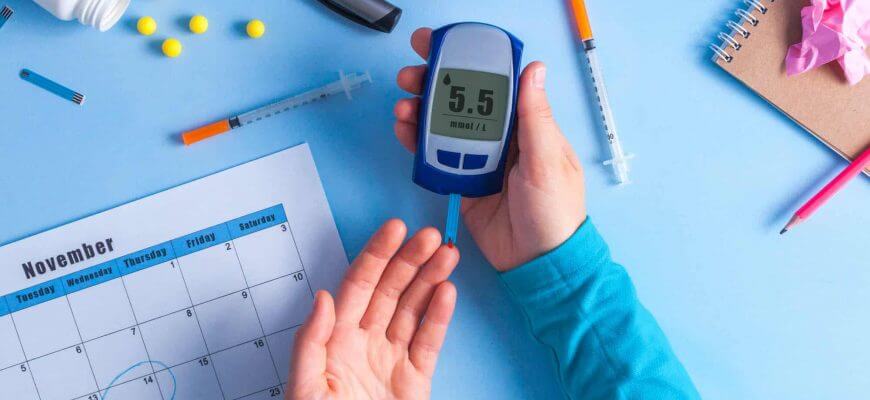
Diabetes is one of the most chronic diseases anyone can face. However, Type 2 Diabetes can be controlled with the right diet, exercise, and oral medication.
Getting word that you have Diabetes mellitus or Type 2 Diabetes might be devastating at first. It’s quite understandable as many people are not familiar with how to live with Type 2 Diabetes. Many people think that Type 2 Diabetes will ruin their entire lives, which is not true at all. In fact, while the diagnosis of Type 2 Diabetes is not ideal as you have to deal with blood sugar, blood pressure, blood glucose and so on, you can still live a happy and healthy life if you take the right steps.
Let’s look at Type 2 Diabetes a little bit closer together to help you put your best foot forward when it comes to living your life with your new diagnosis.
What is Type 2 Diabetes?
This is a great question and one that many people do not know to ask if they are not familiar with Type 2 Diabetes.
This form of diabetes is often associated with a lack of physical activity, heart disease, and high blood pressure and is an adult-onset form that simply means your blood contains too much glucose. When this happens, it is an indication that your insulin is not being used properly (or at all) and glucose runs rampant in your bloodstream.
Without the proper amount of insulin in your body, glucose can cause many different health conditions that could easily be avoided.
Who is at Risk of Developing Type 2 Diabetes?
If Type 2 Diabetes is a disease that is seen in adults as they age, you might be wondering who has more of a risk of developing it. We don’t blame you for wanting to know, and we applaud you for getting a head start on your health and recognize any type 2 diabetes symptoms you or your loved ones start to show.
As we age, our body has an increasingly harder time using insulin effectively. While not every adult will develop adult-onset diabetes, some people who are at higher risk than others are:
- Women who had children that weighed over 9 lbs. at birth
- Women who had gestational diabetes while pregnant
- Family history – people whose immediate family members also have Type 2 Diabetes
- Significantly overweight individuals or diabetic patients
- People who do not exercise regularly
- People who have a poor diet with too many refined carbohydrates and sugars
- Older adults (typically in their 50s or above)
- People with issues with their pancreas or kidney disease
These risk factors do not automatically mean that you will develop Type 2 Diabetes, but the risk increases. What this means for you is that if you match any of the above risk factors, you should carefully monitor your blood sugar levels and consult with a doctor to create a preventative plan before things get out of hand.
Some people live with Type 2 Diabetes for years without realizing they even had it. When this happens, diabetes may be too out of control to fully control it. This is extremely dangerous and can cause medical conditions that might have been avoided had the diabetes been addressed sooner.
What Are the Warning Signs of Diabetes?
Another great question is how does one know if they have Type 2 Diabetes? Thanks to research and medical studies, there are a few warning signs you should pay close attention to when looking for signs you may have Type 2 Diabetes:
- A sudden increase of thirst
- Unexplained and sudden weight loss
- Irritability
- Blurred vision
- Frequent urination
Of course, there may be other warning signs of diabetes that your body gives off to alert you of a problem. With every person having different body makeup, it is impossible to tell which warning signs are certain. If you experience any of the above-mentioned warning signs, consult your doctor immediately.
Gender Does Make a Difference!
So many people want to believe that men and women react the same to different medical conditions, but this is not true. Type 2 Diabetes is one of those health conditions that responds differently based on a person’s gender.
Women may find that they suffer from frequent vaginal yeast infections or thrush, urinary tract infections, or painful sex, known as polycystic ovary syndrome (POS).
Men may experience low testosterone levels, erectile dysfunction, or a decrease in their sex drive.
Both men and women share the diabetes symptoms stated above, and it should be noted when more than one occurs at the same time.
How Do I Treat My Type 2 Diabetes?
Finding the right treatment for you may be more difficult than it is for others. That’s because the right type of treatment for you might not be right for someone else.
Some easy ways to manage your Type 2 Diabetes by yourself include:
- Drink enough water and stay as hydrated as possible
- Eat a healthy diet (there is no prescribed diet for people with diabetes except to avoid refined carbohydrates and excessive amounts of sugar)
- Exercise daily to keep your blood flowing
- Regularly check your blood sugar levels to ensure you’re taking the right medication
If doing these things on your own does not work, there are other treatments you can try.
Medications including Januvia
This may be the most no-brainer answer for helping manage your Type 2 Diabetes, but it is important to mention. We believe strongly in Januvia, which is a Type 2 Diabetes drug that works in conjunction with other diabetes medications to control high blood sugar levels in the body. When used in combination with healthy eating and regular exercise, the body recognizes all of the positive efforts and, in turn, maintains a healthy level of glucose in the bloodstream on a consistent basis. Januvia works to inhibit detrimental enzymes that, when combined with other treatments, helps people with type 2 diabetes have weaker symptoms and significantly improve their life. Be sure not to take Januvia with type 1 diabetes and only take amounts that are prescribed by your doctor.
Insulin
Sometimes, neither medications nor home treatment plans can give your body what it needs in order to live a happy and healthy life. If this is the case, insulin can be prescribed. It is highly unlikely that a person who has Type 2 Diabetes will never need an insulin pump or insulin injections. Therefore, it is important to keep your doctor up to date on all of your medical happenings so they can understand your lifestyle and needs better. Insulin is highly effective but requires the right treatment plan to be put into place first before being used.
Type 2 Diabetes does not have to be a devastating blow to your life. With the right help (as listed above), you can live your best life yet while managing your blood sugar levels each and every day.

